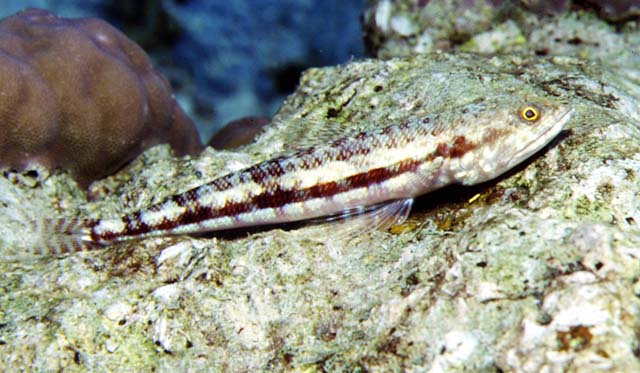| Synodontidae (Lizardfishes), subfamily: Synodontinae |
| 40 cm TL (male/unsexed) |
|
reef-associated; marine; depth range 0 - 121 m |
| Indo-Pacific: Red Sea and East Africa to the Hawaiian, Line, Marquesan, and Ducie islands, north to the Ryukyu Islands, south to the Lord Howe, Kermadec and Rapa islands (Ref. 1602). Reported from New Zealand (Ref. 5755) and Persian Gulf (Ref. 68964). |
|
Dorsal spines (total): 0-0; Dorsal soft rays (total): 10-14; Anal spines: 0-0; Anal soft rays: 8-10. Adults variable from grey to red (Ref. 48635). On some individuals, the hourglass- or saddle-shaped markings along its side may be obliterated by an almost solid dark red band (Ref. 1602). Large individuals are often thick-bodied, giving a hump-backed appearance (Ref. 1602).
Description: Characterized by grey to whitish color; upper side with about six irregular dark bars with smaller blotches in between; lower side with whitish stripe interrupted by dark red to brown bars; fully scaled cheek behind mouth to edge of preopercle; broad interorbital space, 3.9-4.7% of SL; short and triangular flap on anterior nostril; pectoral fin not reaching line connecting origins of dorsal and pelvic fins (Ref. 90102). |
| Inhabits deep lagoon and seaward reefs to depths over 40 m (Ref. 9710); sometimes found on sandy bottoms concealing itself in the sand. Prefers to rest on hard surfaces and frequently occurs in pairs (Ref. 37816). Benthic (Ref. 58302). Feeds on small fishes by seizing these from passing schools, also shrimps (Ref. 89972). Caught with various types of artisanal gear; sold fresh or dried salted in markets. Minimum depth reported taken from Ref. 128797. |
|
Least Concern (LC); Date assessed: 03 March 2015 Ref. (130435)
|
| harmless |
Source and more info: www.fishbase.org. For personal, classroom, and other internal use only. Not for publication.
